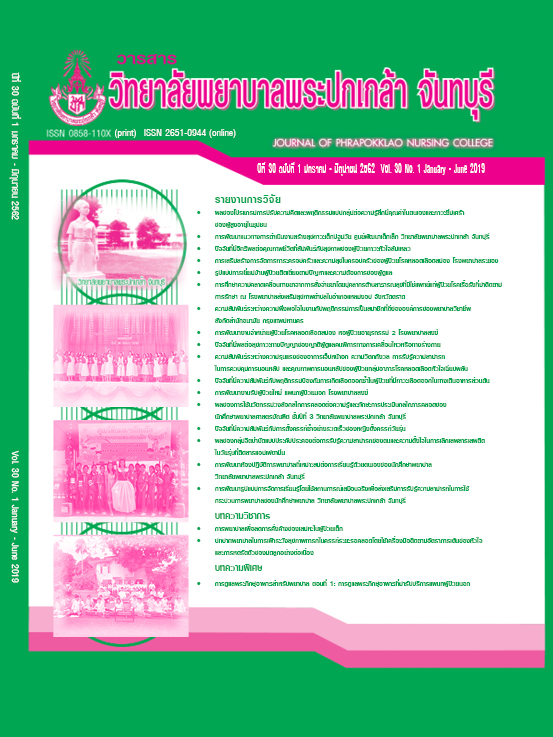Factors Affecting the Spiritual Well-being among Family Caregivers of Persons with Physical Disability
Keywords:
Spiritual well-being, Family caregiver, Person with physical disabilityAbstract
This predictive correlational research aimed to determine the spiritual well-being and factors affecting the spiritual well-being among family caregivers of persons with physical disability. The samples consisted of 180 family caregivers of persons with physical disability in Chanthaburi Province. The research instruments were composed of the Mini-mental State Examination: Thai version, an interview form of general information, an interview form of religious activities with the reliability of .88, an interview form of perceived caregiving burden with the reliability of .82, an interview form of caregiver and care-recipient relationship with the reliability of .94, an interview form of social support with the reliability of .83, and an interview form of spiritual well-being with the reliability of .91. Data were collected from June to August, 2017. Statistics used for data analysis included frequency, percentage, mean, standard deviation, and stepwise multiple regression.
The research results revealed that family caregivers had the mean scores of spiritual well-being by overall and each dimension at a high level. Religious activities, perceived caregiving burden, caregiver and care-recipient relationship, and social support were statistically significant accounted for 25.80% of the variance for spiritual well-being (adj. R2 = .258, p < .05). The most significant predicting factor was caregiver and care-recipient relationship (Beta = .292, p < .001) followed by perceived caregiving burden (Beta = -.175, p < .05).
This research suggests that health care providers should assess spiritual well-being of family caregivers of persons with disability. Additionally, nursing instructors should appropriately apply the research results for lesson regarding home visiting and family caregiver’s spiritual well-being care.
References
กระทรวงการพัฒนาสังคมและความมั่นคงของมนุษย์. (2559). การดำเนินงานจดทะเบียนคนพิการทั่วประเทศ. สืบค้นจาก https://www.m-society.go.th/article_attach/16125/19141.pdf
คณะกรรมการส่งเสริมและพัฒนาคุณภาพชีวิตคนพิการแห่งชาติ. (2554). แผนพัฒนาคุณภาพชีวิตคนพิการแห่งชาติ ฉบับที่ 4 พ.ศ. 2555-2559. กรุงเทพฯ: เทพเพ็ญวานิสย์.
จินตนา ยูนิพันธ์. (2543). ปัจจัยที่มีความสัมพันธ์กับพฤติกรรมการดูแลตนเองด้านสุขภาพจิตของประชาชนไทยภาคกลาง (รายงานผลการวิจัย). กรุงเทพฯ: จุฬาลงกรณ์มหาวิทยาลัย.
ชนัญชิดาดุษฎี ทูลศิริ, รัชนี สรรเสริญ, และวรรณรัตน์ ลาวัง. (2554). การพัฒนาแบบวัดภาระในการดูแลของผู้ดูแลผู้ป่วยเรื้อรัง. วารสารการพยาบาลและการศึกษา, 4(1), 62-75.
พระราชบัญญัติสุขภาพแห่งชาติ พ.ศ. 2550. (2550). ราชกิจจานุเบกษา, 124(ตอนที่ 16 ก), 1-18.
เพียงใจ ติรไพรวงศ์. (2540). สัมพันธภาพระหว่างผู้ดูแลกับผู้ป่วย และภาระการดูแลของสมาชิกครอบครัวผู้ดูแลผู้ป่วยโรคหลอดเลือดสมอง (วิทยานิพนธ์ปริญญามหาบัณฑิต). กรุงเทพฯ: มหาวิทยาลัยมหิดล.
วิไลลักษณ์ ตันติตระกูล, และสุรีพร ธนศิลป์. (2552). ปัจจัยที่มีความสัมพันธ์กับความผาสุกทางจิตวิญญาณของผู้ป่วยมะเร็งระยะสุดท้าย. วารสารสำนักการแพทย์ทางเลือก, 2(3), 27-35.
ศิริลักษณ์ ปัญญา, และเพ็ญนภา แดงด้อมยุทธ์. (2558). จิตบำบัดสัมพันธภาพระหว่างบุคคลแบบกลุ่มกับภาวะซึมเศร้าในผู้ป่วยโรคซึมเศร้า. วารสารพยาบาลตำรวจ, 7(1), 263-278.
สมพร ปานผดุง, กิตติกร นิลมานัต, และลัพณา กิจรุ่งโรจน์. (2556). ความผาสุกทางจิตวิญญาณของญาติผู้ดูแลผู้ป่วยมะเร็งทางนรีเวชระยะลุกลามในโรงพยาบาล (วิทยานิพนธ์ปริญญามหาบัณฑิต). มหาวิทยาลัยสงขลานครินทร์.
สถาบันประสาทวิทยา กรมการแพทย์. (2557). สภาพจิตจากแบบประเมินสภาพสมองเบื้องต้น (MMSE-Thai 2002). นนทบุรี: ผู้แต่ง.
ไหมมูน๊ะ คลังข้อง. (2553). สุขภาวะทางจิตวิญญาณของผู้ดูแลผู้ป่วยมุสลิมที่ป่วยเป็นมะเร็งระยะสุดท้าย (วิทยานิพนธ์ปริญญามหาบัณฑิต). มหาวิทยาลัยสงขลานครินทร์.
Bronfenbrenner, U. (2005). Making human beings human: Bioecological perspectives on human development. Thousand Oaks, CA: SAGE.
Delgado-Guay, M. O., Parsons, H. A., Hui, D., De la Cruz, M. G., Thorney, S., & Bruera, E. (2013). Spirituality, religiosity, and spiritual pain among caregivers of patients with advanced cancer. The American Journal of Hospice & Palliative Care, 30(5), 455-461.
Frost, M. H., Johnson, M. E., Atherton, P. J., Petersen, W. O., Dose, A. M., Kasner, M. J., … Pipe, T. B. (2012). Spiritual well-being and quality of life of women with ovarian cancer and their spouses. The Journal of Supportive Oncology, 10(2), 72-80.
Lawang, W. (2013). Developing support for Thai family caregivers of adults with a physical disability: A community-based action research study (Doctoral dissertation). Melbourne: La Trobe University.
Lawang, W., Horey, D., Blackford, J., Sunsern, R., & Riewpaiboon, W. (2013). Support interventions for caregivers of physically disabled adults: A systematic review. Nursing & Health Sciences, 15(4), 534-545.
Polit, D. F., & Beck, C. T. (2012). Nursing research: Generating and assessing evidence for nursing Practice (9th ed.). Philadelphia: Lippincott, Williams & Wilkins.
Spurlock, W. R. (2005). Spiritual well-being and caregiver burden in Alzheimer’s caregivers. Geriatric Nursing, 26(3), 154-161.
Wongpakaran, T., Wongpakaran, N., & Ruktrakul, R. (2011). Reliability and validity of the Multidimensional Scale of Perceived Social Support (MSPSS): Thai Version. Clinical Practice & Epidemiology in Mental Health, 7, 161-166.
World Health Organization. (2011). World report on disability. Malta: Author.
Downloads
Published
How to Cite
Issue
Section
License
Copyright (c) 2019 JOURNAL OF PHRAPOKKLAO NURSING COLLEGE

This work is licensed under a Creative Commons Attribution-NonCommercial-NoDerivatives 4.0 International License.
เนื้อความ ข้อมูล และรายการอ้างอิงที่ผู้เขียนใช้ในการเขียนบทความเพื่อลงตีพิมพ์ในวารสารวิทยาลัยพยาบาลพระปกเกล้า จันทบุรี ถือเป็นความคิดเห็นและความรับผิดชอบของผู้เขียน คณะผู้จัดทำวารสารไม่จำเป็นต้องเห็นพ้องด้วยหรือร่วมรับผิดชอบ
บทความที่ได้รับการลงตีพิมพ์ในวารสารวิทยาลัยพยาบาลพระปกเกล้า จันทบุรี ถือเป็นลิขสิทธิ์ของวารสารวิทยาลัยพยาบาลพระปกเกล้า จันทบุรี หากหน่วยงานหรือบุคคลใดต้องการนำส่วนหนึ่งหรือทั้งหมดของบทความไปเผยแพร่ต่อเพื่อวัตถุประสงค์ใด ๆ จะต้องได้รับอนุญาตจากบรรณาธิการวารสารก่อน



